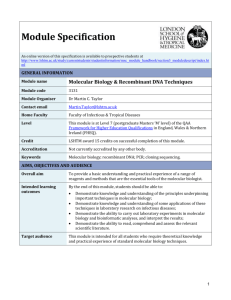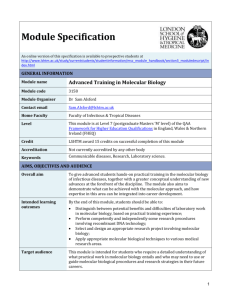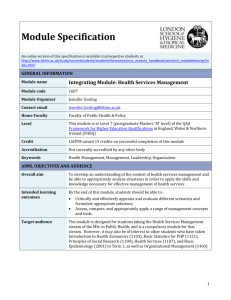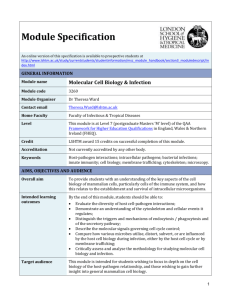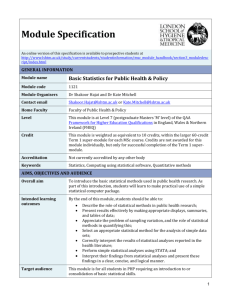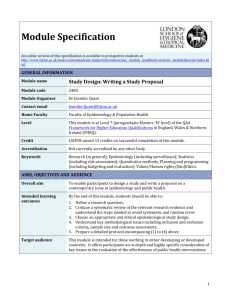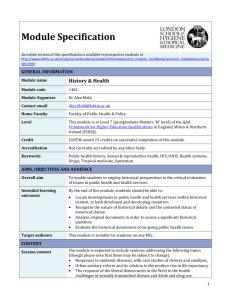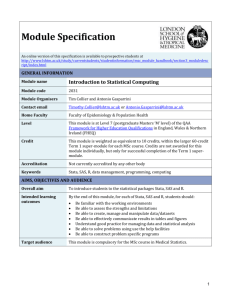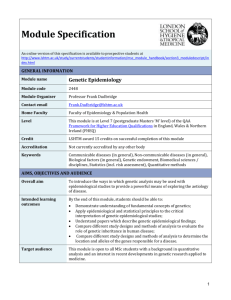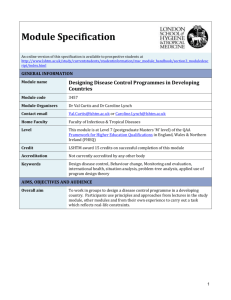3333 Molecular Biology Module Specification
advertisement
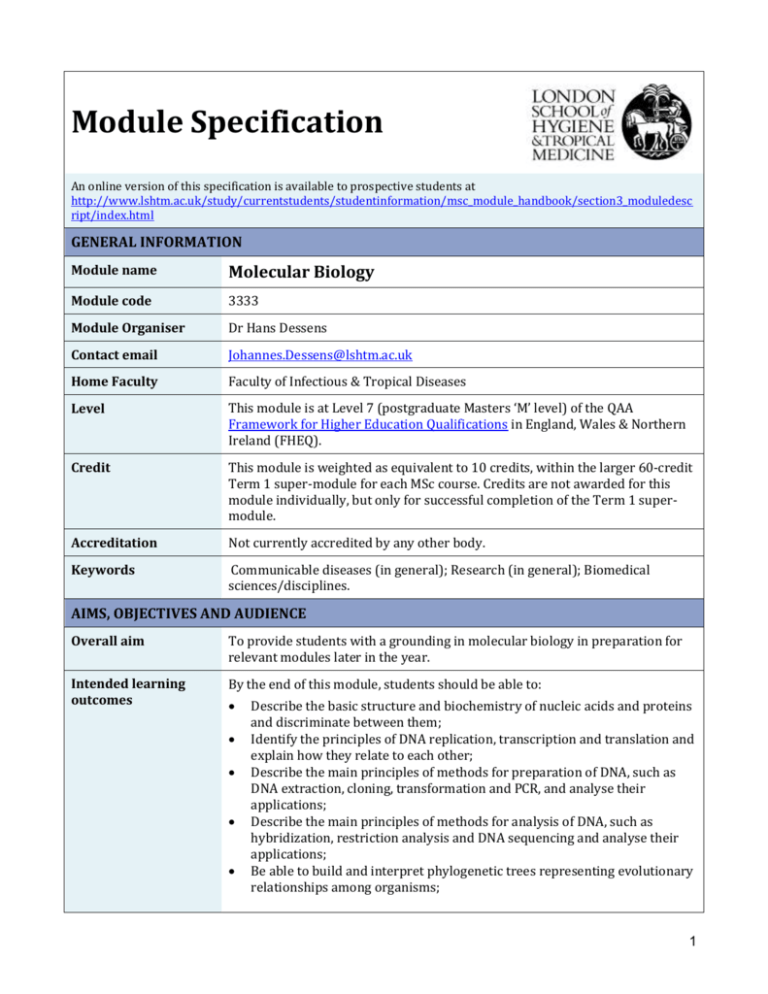
Module Specification An online version of this specification is available to prospective students at http://www.lshtm.ac.uk/study/currentstudents/studentinformation/msc_module_handbook/section3_moduledesc ript/index.html GENERAL INFORMATION Module name Molecular Biology Module code 3333 Module Organiser Dr Hans Dessens Contact email Johannes.Dessens@lshtm.ac.uk Home Faculty Faculty of Infectious & Tropical Diseases Level This module is at Level 7 (postgraduate Masters ‘M’ level) of the QAA Framework for Higher Education Qualifications in England, Wales & Northern Ireland (FHEQ). Credit This module is weighted as equivalent to 10 credits, within the larger 60-credit Term 1 super-module for each MSc course. Credits are not awarded for this module individually, but only for successful completion of the Term 1 supermodule. Accreditation Not currently accredited by any other body. Keywords Communicable diseases (in general); Research (in general); Biomedical sciences/disciplines. AIMS, OBJECTIVES AND AUDIENCE Overall aim To provide students with a grounding in molecular biology in preparation for relevant modules later in the year. Intended learning outcomes By the end of this module, students should be able to: Describe the basic structure and biochemistry of nucleic acids and proteins and discriminate between them; Identify the principles of DNA replication, transcription and translation and explain how they relate to each other; Describe the main principles of methods for preparation of DNA, such as DNA extraction, cloning, transformation and PCR, and analyse their applications; Describe the main principles of methods for analysis of DNA, such as hybridization, restriction analysis and DNA sequencing and analyse their applications; Be able to build and interpret phylogenetic trees representing evolutionary relationships among organisms; 1 Target audience Describe and discuss applications of molecular biology, including the use of bioinformatics and genomics. The module is designed particularly for students who wish to reinforce or update their core knowledge of molecular biology. It is open to MSc courses in Infectious and Tropical Diseases and is a pre-requisite for modules 3131, 3158 and 3160. CONTENT Session content The module is expected to include sessions addressing the following topics (though please note that these may be subject to change): Description and integration of the biochemistry of nucleic acids; Genetic diversity; Gene expression; Basic methods used in molecular biology; How molecular biology relates to other fields of science. TEACHING, LEARNING AND ASSESSMENT Study resources provided or required An introductory folder will be provided by the start of the module. Additional study material will be provided during the course where needed or will be made available electronically. Teaching and learning methods The module will consist of 10 two hour sessions with lectures followed by demonstrations and workshops. For MBID students there will be a compulsory critical review task of a scientific paper. Assessment details There will be MCQ-based formative assessments at the end of the module, with face-to-face feedback in the final week. Attendance of modules 3131, 3158 and 3160 in Term 2 is subject to successful completion (mark >70%) of this assessment Assessment dates Formative assessment will take place in week 10. Language of study and assessment English (please see ‘English language requirements’ below regarding the standard required for entry). TIMING AND MODE OF STUDY Duration The module runs for 10 weeks at 0.5 days per week; this module takes place on Friday afternoons. Dates For 2015-16, the module will start on Friday 9 October 2015 and finish on Friday 18 December 2015. Timetable slot The module runs in LSHTM timetable slot Term 1. Mode of Study The module is taught face-to-face in London. Both full-time and part-time students follow the same schedule. 2 Learning time The notional learning time for the module totals 100 hours, consisting of: Contact time ≈ 20 hours Directed self-study ≈ 40 hours Self-directed learning ≈ 10 hours Assessment, review and revision ≈ 30 hours APPLICATION, ADMISSION AND FEES Pre-requisites None English language requirements A strong command of the English language is necessary to benefit from studying the module. Applicants whose first language is not English or whose prior university studies have not been conducted wholly in English must fulfil LSHTM’s English language requirements, with an acceptable score in an approved test taken in the two years prior to entry. Applicants may be asked to take a test even if the standard conditions have been met. Student numbers Student numbers are typically 70-80 per year; numbers may be capped due to limitations in facilities or staffing. Student selection Preference will be given to LSHTM MSc students and LSHTM research degree students, and particularly MBID students and/or those on other MSc courses who want to take modules 3131, 3158 and 3160 in Term 2. Other applicants will usually be offered a place in the order applications are received, until any cap on numbers is reached. Applicants may be placed on a waiting list and given priority the next time the module is run. Partial Registration (partial participation) by LSHTM research degree students is allowed for this module. However, LSHTM research degree students must attend the first session and complete the final on-line assessment. Fees For registered LSHTM MSc students, fees for the module are included within MSc fees (given on individual course prospectus pages). If registering specifically for this module, as a stand-alone short course, individual module fees will apply. Tuition fees must be paid in full before commencing the module, or by any fee deadline set by the Registry. Scholarships Scholarships are not available for individual modules. Some potential sources of funding are detailed on the LSHTM website. Admission deadlines For 2015-16: For registered LSHTM MSc students, the module choice deadline is the end of Term 1 Orientation Week, Friday 2 October 2015. If registering specifically for this module, applications may be made at any time. The School gives priority to the needs of students registering for Masters and Research Degrees, and so places on any module may be limited - early application is therefore advised. Formal registration will take place on the morning of the first day of the module. 3 ABOUT THIS DOCUMENT This module specification applies for the academic year 2015-16 Last revised 17 July 2015 by Hans Dessens London School of Hygiene & Tropical Medicine, Keppel St., London WC1E 7HT. www.lshtm.ac.uk 4
